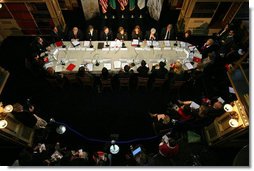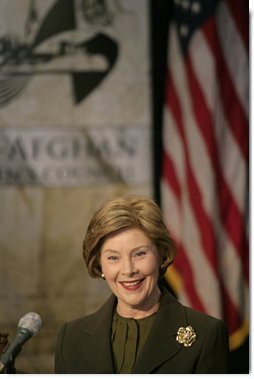|
Home >
News & Policies >
January 2008
|
For Immediate Release
Office of the First Lady
January 17, 2008
Mrs. Bush's Remarks at a U.S.-Afghan Women's Council Roundtable
Georgetown University
Washington, D.C.
10:21 A.M. EST
MRS. BUSH: Thank you so much, Dr. DiGioia. I appreciate it very much. I remember that first time, too, when his little boy was -- baby, six-week-old baby was wearing a t-shirt that said, "So many books, so little time." (Laughter.)
I'm very happy that we're here, especially in this beautiful library. I think this is a fitting site for us, because one of the things that we all know every country needs, and especially something that all of us at this table have worked on, is making sure both girls and boys are educated -- in our country, and in Afghanistan, especially -- especially since girls were denied education for some number of years in the history of Afghanistan. And for some girls it was their whole childhood, so they grew up illiterate.
 And we know that literacy can go on for your whole life. We want it to,
just like there are so many books and so little time. So one part of a
literacy movement in Afghanistan, of course, also involves adult literacy.
And we know that literacy can go on for your whole life. We want it to,
just like there are so many books and so little time. So one part of a
literacy movement in Afghanistan, of course, also involves adult literacy.
But I want to especially send my acknowledgments to Ambassador Jawad and to Shamim. Thank you very, very much. Thank you for your friendship, and thank you for your very hard work for your country. The Under Secretary of State for Democracy and Global Affairs is with us today, Paula Dobriansky, who is also -- right next to me -- a member of the Afghan-American Women's Council, and has been very active in the whole time that we've been working together -- women from Afghanistan and women from the United States -- for the people of Afghanistan.
I'm so happy to be here with all the members of the U.S.-Afghan Women's Council. I want to thank you for the outstanding work you've done. I hope people -- and I hope we'll have a chance in a minute to get to hear from all of you and hear about what has happened and what each one of you are working on with the Council and also individually as individual American citizens or citizens of Afghanistan.
Today's gathering is an important milestone. This is the Council's 10th meeting, and it's the first meeting that we've had as a council here at Georgetown University, which we hope will be the new home, private sector home, to the U.S.-Afghan Women's Council. The move, of course, the transfer is still in progress, but I want to thank Dr. DiGioia and Dr. Magrab for your efforts to make this happen. This move will ensure that the Council's work can continue on after 2009 and for a long time.
The U.S.-Afghan Women's Council represents the close ties between the United States and Afghanistan. Since 2001, our countries have worked together to help the people of Afghanistan recover from decades of conflict and repression.
And one thing I was struck with after September 11th, when the eyes of the United States turned toward Afghanistan, was the very strong feeling of American women to help women in Afghanistan. I really sensed a sisterhood between the women of the United States and the women of Afghanistan. Even when I went to the cosmetic counters at a department store, people who sold cosmetics would mention the women of Afghanistan to me. And that's why every one of the people who are around this table are here -- all the women -- because each one of these women were moved to do something to try to help, and I want to thank you all for that.
 Our partnership is yielding promising results. Afghan women and men are
working to build a stable democratic society. Millions of Afghans,
including about 40 percent of those who are women -- were women -- voted in
the two peaceful and democratic elections that Afghanistan has already
held. A new round of elections is anticipated in 2009.
Our partnership is yielding promising results. Afghan women and men are
working to build a stable democratic society. Millions of Afghans,
including about 40 percent of those who are women -- were women -- voted in
the two peaceful and democratic elections that Afghanistan has already
held. A new round of elections is anticipated in 2009.
Afghanistan is building its national army and its police force, providing both security and jobs. Parliamentarians, journalists, nearly 1,000 judges have been trained. Independent radio and television stations have been established, laying the groundwork for a free press.
These are developments we all wish the press would cover, and so I want to welcome the members of the press who are here with us so that we could hear the good news out of Afghanistan and not just the bad news that seems to dominate the front pages now.
We'd like to know -- for people to know all across our country and all across Afghanistan that there have been dramatic improvements in health care. In 2001, only 8 percent of Afghans had access to basic health care, and today that number is 82 percent. That's a dramatic increase in just a few years.
Two years ago, only 35 percent of Afghanistan's population had been inoculated against polio -- a disease that's been effectively eradicated in the United States. Today, 95 percent of Afghans have received their polio vaccinations, including 7 million children.
Since the Taliban era, Afghanistan's child mortality rate has dropped by nearly 25 percent. That means more than 80,000 young children and babies are saved.
Under the Taliban, only 900,000 children were in school, almost all of them boys. Today, thanks to the partnership between Afghanistan, the United States and the international community, schools are being rebuilt, teachers are being trained, millions of textbooks are being translated, printed and distributed to schoolchildren, and more than 5 million children are in school -- almost 2 million of them girls.
With support from many nations, the Afghans are also building their country's economy and infrastructure. In 2002, Afghanistan had only 50 kilometers of paved roads. Today, 2,500 kilometers of roads stretch across Afghan soil. Afghanistan now has a formal banking system, and an internationally recognized currency. Since 2001, the Afghan economy has grown by an average of 15 percent a year. And that's an excellent average.
Improvements in Afghan agriculture are helping to reduce the appeal of poppy production. Farmers are receiving training and help to produce alternative crops that are in global demand, like pomegranates and tulips. Afghan-grown vegetable crops are being sold for millions of dollars in Dubai. And while poppy production is a problem, especially in the southern part of the country, the value of Afghanistan's opium exports relative to the nation's GDP has declined by half over the last three years.
These developments are bringing hope to the people of Afghanistan. Of course, there are still many challenges, and those are the ones we read about in the newspaper. Rural areas lack the basic infrastructure of roads, irrigation and electricity. And of course, this keeps rural areas remote from education and from economic development. Many people struggle to provide for the basic human needs of food, clean water and shelter.
Afghanistan faces the challenge of capacity. And this is something we in the United States take for granted. Maybe we've never -- it's never occurred to us that countries need to develop their capacity to be able to even use donations from the rest of the world.
As the nation receives donations from the international community, Afghanistan needs capable citizens who can make sure this assistance reaches Afghans living in the country's most remote areas. Trained professionals who can use these -- manage these resources so that they're used to meet the geographical and cultural demands of Afghanistan are needed. Building this capacity requires time and an investment in the people of Afghanistan.
The work of the U.S.-Afghan Women's Council is important. Through the Council, individual American citizens, mainly women, are making a very personal investment in Afghanistan's women. Members of the Council know that for a society to succeed, all parts of the society must be able to contribute -- both men and women. Council initiatives have educated women judges and lawyers about Afghanistan's new constitution. Women parliamentarians have come to the U.S. to meet with members of Congress. Hundreds of midwives are being trained to help reduce Afghanistan's high maternal mortality rate. Micro-credit loans have been extended to Afghan entrepreneurs. Afghan women manage community banks, and attend graduate-level business seminars in the United States.
I'm proud to be involved with the Council's Women's Teacher Training Institute, which I visited when I was in Kabul. At the Institute, women have a safe place to live while they're trained to be teachers. Then they go back to their villages and train more teachers in a cascading effect, with the goal of opening and staffing as many schools as quickly as possible. So far USAID has provided $20 million to support the Institute, which has already trained hundreds of teachers since it opened in September 2004.
The Council's work over the last five years has been remarkable. A small group of private citizens in the United States has raised $70 million -- about $12 million from the private sector -- for programs that are improving the lives of women and children across Afghanistan.
The Council shows what individual Americans can do to aid our country's humanitarian efforts in Afghanistan. It shows what Afghans can do to invest in their country's future.
Thank you to all of the Council members who are here. Thank you for your generosity. Thank you for your dedication and your hard work. And now, I'm looking forward to hearing from each of you about your programs. Thank you all very much. (Applause.)
* * * * *
MRS. BUSH: I just want to thank everyone again. I want everyone to know, especially the people of Afghanistan, how invested the United States is in the success of Afghanistan. Not only, obviously, have we given a lot of money, both from the private sector and from the public sector, but we've lost a lot of lives in Afghanistan. And it's very important to us that Afghanistan succeed.
And one special characteristic of Americans that I think is really important is that Americans genuinely and sincerely want to see other people succeed. We really do. I mean, I think that's a special characteristic of Americans. We don't see other people's success as some sort of detriment to us, but in fact we are encouraged and buoyed by the success of other people -- and especially Afghanistan.
So I hope that everyone will get those words out. I'm getting ready to do a television interview for Afghanistan in just a few minutes, where I'll say that again, but I really hope that the people of Afghanistan know how invested the people of the United States are and how proud we are to stand with you. And Afghanistan has a great chance now to really seize the moment. (Applause.) So thank you all so much.
END 11:41 A.M. EST


